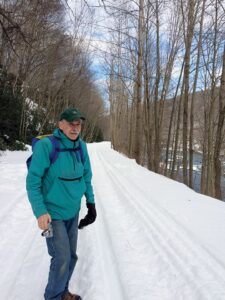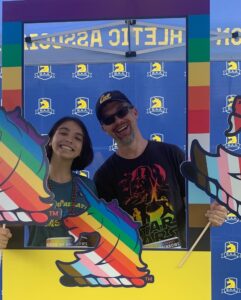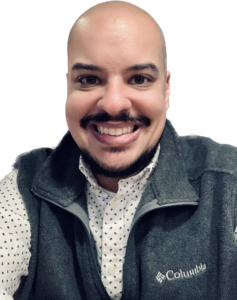Journeys to Humanism: Questioning Preachers, Evolving Parenthood, and Finding Harmony
 Stuart Thompson
Stuart Thompson Journeys to Humanism, theHumanist.com’s regular series, features real stories from humanists in our community. From heartwarming narratives of growth, to more difficult journeys, our readers open up about their experiences coming to humanism.
Stuart Thompson
Whitney, PA
I was perhaps twelve at the time. The family was making one of its infrequent visits to the neighborhood Methodist church. We sat where we customarily did—right hand side, about two-thirds of the way back from the front. The preacher, both hands firmly propped against the lectern, was holding forth as usual and with absolute certainty as to the truth of his evidence-free assertions. On this sunny Sunday morning, though, and for reasons entirely unknown to me, I was paying attention. At a point I found myself looking intently at the minister and saying—quite to myself—“You don’t know that.”
At the age of twelve I did not have anything approaching a humanist vocabulary within which to place my newfound wake-up call. But, slowly, from that point on, the vocabulary grew.
My parents, thankfully, never did push religion on their children. We made our erratic excursions to church entirely, I’m guessing, at the behest of my father’s mother. Upon her passing the visits stopped.
I’ve often wondered that, had I grown up in a delusion-ridden family, would I now be a humanist/skeptic/atheist/hiker/stout drinker?
 Darren Bouwmeester
Darren Bouwmeester
Boston, MA
My wife and I had attended a Southern Baptist Church for about fifteen years. We were small group leaders and had led college fellowship groups. We had done outreach to international students trying to convince atheists from mainland China why they needed Jesus and salvation. Our life was filled with church, so much so that when we became parents, we found the church to be a restrictive and controlling place. We were expected to go where they told us. The religious leaders at our church taught us that obedience to god was demonstrated by obedience to Pastoral leadership. Life decisions were all subject to the whims of people who claimed to speak for god. All the while we tried to live a good and moral life. Ultimately we saw the restrictive life imposed by the church to be suffocating and when faced with question of whether we wanted our children to live this kind of life, we knew that we had to leave that church.
Leaving the Southern Baptist Church, my wife and I found a more progressive non-denominational church. They tried to live a more compassionate and kind life of faith. They were diverse and inclusive and were welcoming to LGBTQ people. They allowed women to participate in leadership. All of these things were not without controversy as the church tried to show how these things were actually biblical. All of this was helpful to me because I had to decide what I believed in and why. What I ultimately believed in was humanism. I realized that I believed in treating others how I wish to be treated. People should be treated with dignity and respect and love is love. What I realized is that religion often got in the way of people doing the right thing. I feel like even the most well-meaning Christians had to do all kinds of mental gymnastics to get to the point where they could treat people with decency. At that point I realized I was a humanist who didn’t need religion to be a good person.
When I was at my Southern Baptist Church they’d often rebuke people for being humanistic. It was a bad thing to just be nice to other people, without having Jesus as the reason, a position which now seems amoral to me. I do think religion played an important role in my development as a person, but what I realize now is that religion was found wanting.
 Ryan Mulkowsky
Ryan Mulkowsky
Atlanta, GA
My journey to humanism was a slow crawl through years of doubt and religious trauma. I realized over time that many of the ideals I grew up with and believed when I was religious were actually found in humanism, and humanism on a greater level espoused values and commitments that I feel embrace all of humanity in life-giving, affirming ways as opposed to religion. For me, it has been a great privilege to be able to truly love people as they are: human. I don’t have to carry toxic, life-limiting beliefs anymore but I am now truly free to believe according to my conscience and utilize observable, empirical practices to form and practice my values and commitments. I have also learned to live in harmony with all peoples, religious or not, and learn to respect their humanity while also advocating for a society that embraces plurality and secular humanist values.
We all have our own stories of how we came to be humanists, and we want to hear yours! Fill out the form here to be featured in this series. You can also share your journey and chat with others on the Journeys to Humanism channel on the AHA’s Discord Server.
